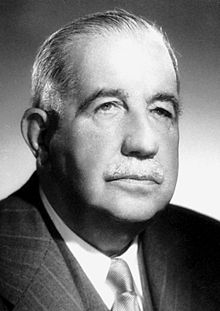Léon Jouhaux
Léon Jouhaux (born July 1, 1879 in Paris , † April 29, 1954 there ) was a French trade unionist. He was arrested by the Nazis in 1943 and later deported to Buchenwald concentration camp . In 1951 he received the Nobel Peace Prize for his outstanding role within the trade union peace movement and his years of struggle for workers' rights.
life and work
Léon Jouhaux was born in 1879 as the son of a factory worker. He could not finish his school education because he had to help the family with work and improve the financial situation with part-time jobs. He was also denied a later visit to a high school after trying for a few months. Instead, he worked in a Paris factory for matches , where he joined the union at the age of 16 and was actively involved. He organized a strike that year for better working conditions, but lost his job because of his activity.
Career in the French union
In the following years he worked his way up in the union and in 1909 became general secretary of the central trade union confederation Confédération Générale du Travail (CGT). In this position he tried to bundle the political and social direction of the various trade union organizations and organized strike campaigns against conscription , at the same time he advocated the party political independence of the CGT. During the First World War he led the CGT into the national united front of the Union sacrée . He endeavored to curb collective bargaining disputes through close cooperation with representatives of politics and cooperated with the responsible ministries.
International trade union work
In 1919 Léon Jouhaux worked as a technical expert and speaker for international labor legislation at the peace conference in Paris. At that conference he became one of the founders of the International Labor Organization (ILO) and was installed as Vice-President of the International Trade Union Confederation . He also became a member of the Governing Body of the ILO and remained so until his death.
During his work for the ILO as well as at the conferences of the League of Nations , in which he participated as a delegate of the French government in 1924 and 1938, he was vehemently in favor of disarmament . He demanded that there must be national and international state control mechanisms for arms production, whereby he assigned the international role to the League of Nations.
In the late 1930s, Léon Jouhaux, along with the CGT, was a strong opponent of the political development of France. In 1938 he traveled to the USA and tried to report to the US President Franklin D. Roosevelt about the nationalist developments in Europe and to get him to intervene, but this plan failed. In the summer of 1940 France was invaded by German troops and the CGT was dissolved. Jouhaux was arrested several times and finally deported to the Buchenwald concentration camp on March 1, 1943 .
On May 1, 1943, Jouhaux was transferred to Itter Castle in Tyrol (officially a branch of the Dachau concentration camp; the accommodation was described as pleasant). He received permission that his secretary (and later partner) Augusta Bruchlen could come to him; she arrived on June 18th.
On May 5, 1945, the inmates of Itter Castle were liberated by some soldiers of the Wehrmacht (under Major Josef Gangl ) and the American Army ( 103rd US Infantry Division , Commander: General McAuliffe ) at the Battle of Itter Castle . In view of the small number of US soldiers, soldiers of the Waffen SS who had guarded the castle until then tried to recapture it; this failed.
After the war, Jouhaux became France's representative to the United Nations and President of the Labor Department at the ILO . From 1947 he was also chairman of the French economic council. In 1948 he founded a new French trade union called Confédération générale du ouvrière travail-Force , as it the undermining of independent socialist labor unions loyal to Moscow communist or Stalinist feared agents and tried the global trade union movement before the split in the wake of the Cold War to preserve .
He died in April 1954 of a heart condition that had already hit him hard during wartime.
literature
- Bernhard Kupfer: Lexicon of Nobel Prize Winners. Patmos Verlag, Düsseldorf 2001
Web links
- Information from the Nobel Foundation on the 1951 award ceremony for Léon Jouhaux (English)
- Literature by and about Léon Jouhaux in the catalog of the German National Library
Footnotes
- ↑ Augusta Léon-Jouhaux wrote a book entitled Prison pour hommes d'État (about: Prison for Statesmen), published in 1973.
| personal data | |
|---|---|
| SURNAME | Jouhaux, Léon |
| BRIEF DESCRIPTION | French trade unionist and Nobel Peace Prize winner |
| DATE OF BIRTH | July 1, 1879 |
| PLACE OF BIRTH | Paris |
| DATE OF DEATH | April 29, 1954 |
| Place of death | Paris |
